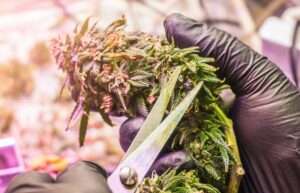It’s no surprise that the effects of cannabis can differ based on various factors, including an individual’s body fat and metabolism, delivery method, personal tolerance, and even age. What may come as more of a surprise is just how versatile cannabis can be, crossing the boundaries of stimulants, depressants, and hallucinogens. While the chemical makeup of various strains determines whether they produce relaxing or energizing effects, other variables influence that as well. Diverse factors such as an individual’s tolerance level and dosage can subtly (or significantly) influence how a person responds to cannabis.
Different types of effects that cannabis can have
Cannabis is a plant that contains many psychoactive substances. The most well-known of these is THC, which is responsible for the plant’s intoxicating effects. Cannabis can be smoked, eaten, or vaporized, and it is often used for recreational purposes. However, the plant also has a long history of medical use, and it is now legal in many states for medical purposes. Cannabis affects people in different ways, depending on the strain, the method of ingestion, and the person’s individual physiology. The plant can produce feelings of relaxation or euphoria, and it can also increase appetite and reduce pain. Cannabis can also have positive effects on cognitive function, and it has been shown to improve task performance and memory recall in some studies. Overall, cannabis has a wide range of potential effects, and its effects vary from person to person.
The different factors that influence how cannabis will affect someone
There are a variety of factors that can influence how cannabis affects an individual. The most well-known of these is the strain of cannabis that is used. Cannabis strains can be broadly divided into two categories: Indica and Sativa. Indica strains are generally associated with relaxation and sedation, while Sativa strains are thought to produce more energizing and uplifting effects. However, there is some evidence to suggest that there is no difference in the effects of Indica and Sativa strains and that the effects of cannabis are primarily determined by the level of THC present in the plant.
Cannabis also contains CBD, a compound that has been shown to counteract some of the negative effects of THC, such as anxiety and paranoia. CBD is thought to work by binding to receptors in the brain that are responsible for regulating mood and fear. The ratio of THC to CBD in a particular strain of cannabis can influence its effects, with strains that have higher levels of CBD producing more mellow and relaxing effects.
The method of ingestion is another important factor that can influence the effects of cannabis. Smoking or vaporizing cannabis results in rapid absorption into the bloodstream, which leads to a quick onset of effects and a shorter duration of action. Eating cannabis-infused foods (edibles) results in slower absorption, with effects typically taking effect after 30 minutes to an hour. Edibles also have a longer duration of action, lasting for several hours.
The individual’s physiology is also a factor that can influence how cannabis affects them. Factors such as age, weight, metabolism, and body fat percentage can all play a role in how quickly cannabis is absorbed into the bloodstream and how long its effects last. People who are overweight or have a high body fat percentage may find that cannabis has a stronger and more long-lasting effect, due to the fact that THC is stored in body fat.
Cannabis tolerance is another factor that can influence how the plant affects an individual. Tolerance occurs when the body becomes less sensitive to the effects of a substance over time. People who use cannabis regularly may find that they need to use more and more of the plant to achieve the desired effect. On the other hand, people who have not used cannabis for a long time may find that they are more susceptible to its effects.
Dose-dependent effects of CBD and THC
Cannabis plants contain hundreds of different chemical compounds, including dozens of cannabinoids. Two of the most well-known cannabinoids are CBD and THC. Both CBD and THC have been shown to have a wide range of medicinal properties, but they also have different effects on the body. THC is the cannabinoid that is responsible for the psychoactive effects of cannabis, while CBD does not produce any psychoactive effects. In addition, THC is known to have stronger medicinal effects than CBD. However, the effects of both cannabinoids are dose-dependent, meaning that higher doses will produce stronger effects. For instance, a low dose of THC may simply make a person feel relaxed, while a high dose can cause intoxication and alter perception. Similarly, a low dose of CBD may be ineffective in treating certain conditions, while a high dose can be very effective. As a result, it is important to consider both the dosage and the ratio of CBD to THC when using cannabis for medicinal purposes.
Cannabis affects everyone differently, and there are a variety of factors that can influence its effects. The strain of cannabis, the method of ingestion, and the person’s individual physiology all play a role in how cannabis will affect them. People who use cannabis regularly may develop tolerance to its effects, while people who are new to using cannabis may be more susceptible to its effects. These various factors can be daunting to navigate. But with our help, you can find the right strain and dosage for you. Schedule your appointment today and we’ll help you get started on your cannabis journey.






